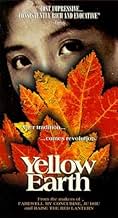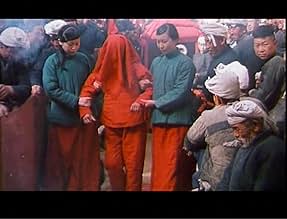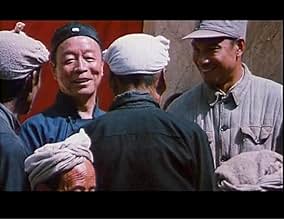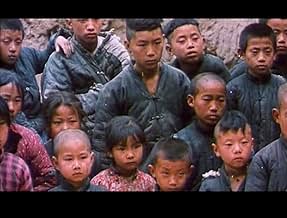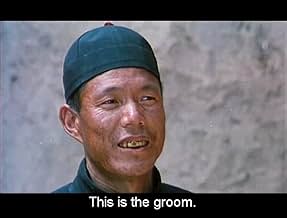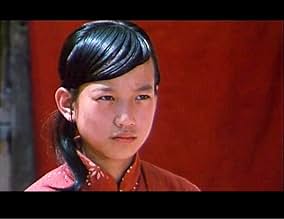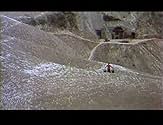NOTE IMDb
7,1/10
2,7 k
MA NOTE
Ajouter une intrigue dans votre langueA communist soldier travels to Shanbei to collect folk songs for propaganda while visiting a poor peasant family, giving hope to the teenage daughter in escaping an arranged marriage.A communist soldier travels to Shanbei to collect folk songs for propaganda while visiting a poor peasant family, giving hope to the teenage daughter in escaping an arranged marriage.A communist soldier travels to Shanbei to collect folk songs for propaganda while visiting a poor peasant family, giving hope to the teenage daughter in escaping an arranged marriage.
- Réalisation
- Scénario
- Casting principal
- Récompenses
- 8 victoires et 5 nominations au total
Avis à la une
Yellow Earth is a classic film, which reflects that the situation of peasant's life is in yellow earth. At the beginning of the film, with a folk, the screen shows audience the background of this movie, which is a soldier came to yellow earth for collecting folk. With the development of story, the viewer can find that the situation of local environment is poor and austere, their thought is conservative and antiquated, and local people is humane and ignorance. However, through the soldier's describing, you can make comparison between yellow earth and the South in thought, education and so on. Although these traditional rules and culture were the same before many years ago, with the development and changing of society, China was changing. However, local people still live in the primitive China, their life is poor, cannot get education and keep the old traditional custom.
In Yellow Earth, there are some details reflecting thought of Confucian. The girls must obey parents' order and have matchmaker making match, which is the traditional thought for marriage. For example, when the soldier told them that girls can own choose husband and marriage by themselves in South now and people claim loving in freedom, Cui Qiao's father cannot accept this thought. He still thinks that daughter's marriage need traditional rules. If not, he thinks that it is not good for the girl. It not only reflects that thought of Confucian, but also shows that local people' thought is antiquated, adamant and old- fashioned. In the film, although Cui Qiao's father knows that Cui Qiao is not willing to marriage, he cannot change mind and persuade Cui Qiao agree. Except for this, When the soldier asks Cui Qiao's father about his daughter's marriage, the man told him that couple do not need premarital feeling, which means they do not need love each other. This action and thought is like in the antiquity. At the antiquity, girls do not know who will be her husband and what his appearance is. And Cui Qiao's father says this marriage was confirmed when Cui Qiao was a child, which is another traditional culture.
Second, in the film, it reflects that the position of women is low and the position between man and woman is not the balance. Girls cannot choose husband and have liberal love. Except for this, generally, the man can be older than girl and the differential of age is big. Like Cui Qiao and her husband. The reason why Cui Qiao will marry with her husband is when she was a child, her home is poor, and, for his brother, her father agree this marriage. In the local place, it is the common phenomenon. However, this kind of marriage is cruel and cannot be accept for girls. In the film, the bride does not have smile including not only Cui Qiao but also the bride is at the beginning of the film. For marriage, girls are not satisfied but they have to accept for their family and themselves. At yellow earth, girls have only one way that is marriage. However, only one way is that they cannot decide and choose by themselves, which is dolorous.
Third, it is conflicted for local people to see yellow earth. In the film, a shot is Cui Qiao' father stand on yellow earth, he looks at sky and feel helpless, sad, because there is no rain for a long time. He told the soldier that no one want to farm in yellow earth because this sod is not suitable to farm, but they cannot give up yellow earth because they depend on this sod to live. This is a conflicted emotion. Local people know the problem of sod but they think this sod feed them, so they cannot give up yellow earth. And, Cui Qiao has the same conflicted emotion. She cannot accept her marriage but she cannot oppose for her brother and father, which reflects that she is a humane and dutiful daughter.
Except for these, through film, I find that local people have not good education at that place, so it causes that they are unknown and thought is antiquated. When the soldier wants to write a couplet, Cui Qiao refuses him because no one knows words. They cannot get education, it caused that their thought is antiquated and do not want to know new information and rules. They still keep to tradition. And in the film, there a lot of time having no dialogue. Local people are silence. They do not talk with others, only when they meet difficulty, they can sing a folk to say about the difficulty of their life. At the end of film, Cui Qiao wants to change her life, she try her best to find the new way. She wants to get freedom. So, she leaves her home, cut her hair and find to the Red Army by herself. It means the girl aspire to freedom.
Thus, I think that this film – Yellow earth is good film. It lets the viewer know that farmers' life in yellow earth at that time and a traditional custom.
In Yellow Earth, there are some details reflecting thought of Confucian. The girls must obey parents' order and have matchmaker making match, which is the traditional thought for marriage. For example, when the soldier told them that girls can own choose husband and marriage by themselves in South now and people claim loving in freedom, Cui Qiao's father cannot accept this thought. He still thinks that daughter's marriage need traditional rules. If not, he thinks that it is not good for the girl. It not only reflects that thought of Confucian, but also shows that local people' thought is antiquated, adamant and old- fashioned. In the film, although Cui Qiao's father knows that Cui Qiao is not willing to marriage, he cannot change mind and persuade Cui Qiao agree. Except for this, When the soldier asks Cui Qiao's father about his daughter's marriage, the man told him that couple do not need premarital feeling, which means they do not need love each other. This action and thought is like in the antiquity. At the antiquity, girls do not know who will be her husband and what his appearance is. And Cui Qiao's father says this marriage was confirmed when Cui Qiao was a child, which is another traditional culture.
Second, in the film, it reflects that the position of women is low and the position between man and woman is not the balance. Girls cannot choose husband and have liberal love. Except for this, generally, the man can be older than girl and the differential of age is big. Like Cui Qiao and her husband. The reason why Cui Qiao will marry with her husband is when she was a child, her home is poor, and, for his brother, her father agree this marriage. In the local place, it is the common phenomenon. However, this kind of marriage is cruel and cannot be accept for girls. In the film, the bride does not have smile including not only Cui Qiao but also the bride is at the beginning of the film. For marriage, girls are not satisfied but they have to accept for their family and themselves. At yellow earth, girls have only one way that is marriage. However, only one way is that they cannot decide and choose by themselves, which is dolorous.
Third, it is conflicted for local people to see yellow earth. In the film, a shot is Cui Qiao' father stand on yellow earth, he looks at sky and feel helpless, sad, because there is no rain for a long time. He told the soldier that no one want to farm in yellow earth because this sod is not suitable to farm, but they cannot give up yellow earth because they depend on this sod to live. This is a conflicted emotion. Local people know the problem of sod but they think this sod feed them, so they cannot give up yellow earth. And, Cui Qiao has the same conflicted emotion. She cannot accept her marriage but she cannot oppose for her brother and father, which reflects that she is a humane and dutiful daughter.
Except for these, through film, I find that local people have not good education at that place, so it causes that they are unknown and thought is antiquated. When the soldier wants to write a couplet, Cui Qiao refuses him because no one knows words. They cannot get education, it caused that their thought is antiquated and do not want to know new information and rules. They still keep to tradition. And in the film, there a lot of time having no dialogue. Local people are silence. They do not talk with others, only when they meet difficulty, they can sing a folk to say about the difficulty of their life. At the end of film, Cui Qiao wants to change her life, she try her best to find the new way. She wants to get freedom. So, she leaves her home, cut her hair and find to the Red Army by herself. It means the girl aspire to freedom.
Thus, I think that this film – Yellow earth is good film. It lets the viewer know that farmers' life in yellow earth at that time and a traditional custom.
A young slodier from the communist party is sent to northern China to collect some "happy" fols songs for helping the party boost army's morale during the battle against Japanese invasion in 1939 shortly before WW2. There he meets a farmer family- a father and 2 kids- but all songs they know is about endless suffering and pain.
Director Kaige Chen uses this setting to build up a rather interesting encounter between 1. a young soldier full of ideologies and strong beliefs and 2. a poor family in rural north China with extreme living difficulties and hardships. The young soldier believes that sickles and hammers will help these poor people and build them roads but we as viewers know that such things won't happen, we've seen that no ideology will end these circumstances.
The film is believed to be a Chinese communist propaganda vessel but what I gathered from this film was that it shows communism- maybe not directly- as yet another incompetent, useless set of beliefs.
This is not an enjoyable film, nor is it easy to watch. It feels really long for 86 minutes and it desparately needs a restoration. What it does however, is it opens discussions with friends, it makes people think and of course it's a very influential, historically important cinematic piece.
Director Kaige Chen uses this setting to build up a rather interesting encounter between 1. a young soldier full of ideologies and strong beliefs and 2. a poor family in rural north China with extreme living difficulties and hardships. The young soldier believes that sickles and hammers will help these poor people and build them roads but we as viewers know that such things won't happen, we've seen that no ideology will end these circumstances.
The film is believed to be a Chinese communist propaganda vessel but what I gathered from this film was that it shows communism- maybe not directly- as yet another incompetent, useless set of beliefs.
This is not an enjoyable film, nor is it easy to watch. It feels really long for 86 minutes and it desparately needs a restoration. What it does however, is it opens discussions with friends, it makes people think and of course it's a very influential, historically important cinematic piece.
Ugh, this is a hard movie to watch. It is both boring and depressing -- and yet really good! How crazy that it works out that way. Maybe because it's a little TOO close to the experience of real life. Here we have a film that's a window into the life of Cuiqiao, and her tiny family of peasants, in a north-western province of China during World War II.
The music is a motif and the main thematic element of the film, expressing the misery most eloquently. The plot sees a lowly Communist officer trying to catalog or find folk songs for the Communist foot-soldiers to sing as morale-boosters. The best singer in town is the shy and depressed Cuiqiao whose life is pitiable. I won't go into details, but it is depressing for reasons that are equally social and economic. The officer seems nice, but he seems like another pawn in a bigger power game -- a guy who really isn't so sure of his faith in the party beyond a means of escape. He's just another guy staying one step ahead of the virulent poverty the main characters suffer through.
Seriously, the stuff is really affecting and memorable. The funny scene or two in this movie is all the more smile-inducing because you're just so glad for the break in the bleak atmosphere. And the songs -- mein gott, what grating stuff to spoiled western ears, but simultaneously so gut-wrenching! I'd call this a period piece, but the experiences of rural western villagers in China are probably pretty timeless. I mean, the landscape is certainly changing, but there are a lot of places that are still like this.
Watch it, you spoiled punks!
The music is a motif and the main thematic element of the film, expressing the misery most eloquently. The plot sees a lowly Communist officer trying to catalog or find folk songs for the Communist foot-soldiers to sing as morale-boosters. The best singer in town is the shy and depressed Cuiqiao whose life is pitiable. I won't go into details, but it is depressing for reasons that are equally social and economic. The officer seems nice, but he seems like another pawn in a bigger power game -- a guy who really isn't so sure of his faith in the party beyond a means of escape. He's just another guy staying one step ahead of the virulent poverty the main characters suffer through.
Seriously, the stuff is really affecting and memorable. The funny scene or two in this movie is all the more smile-inducing because you're just so glad for the break in the bleak atmosphere. And the songs -- mein gott, what grating stuff to spoiled western ears, but simultaneously so gut-wrenching! I'd call this a period piece, but the experiences of rural western villagers in China are probably pretty timeless. I mean, the landscape is certainly changing, but there are a lot of places that are still like this.
Watch it, you spoiled punks!
Not far from the yellow river there is a big area where the earth also is yellow and the climate and living are very harsh, this time because of a drought. First we see a wedding ceremony with the bride little more than 12 years old, a happy occasion for everyone except for the skeptical onlooking Cuiqiao whose fate will be similar in short time and the bride herself. Enter folk song collector comrade Gu who stays with her family for some time. His talk of whats going on in the south, the end of arranged weddings and equality of women sets a deep impression on Cuiqiao, but also her mute brother.
Much of the film is told in its folk songs and its pictures. Cuiqiaos misery is told with songs: "of all the people//girls are the most miserable" and her new hope with the songs of the Party.
The pictures leave much room for the environments to sink in. Distances are big and the landscape homogeneous, that is earth covered mountains and a wide yellow river. In a setting such as this, the figures get small, and even more so by the devotion Zhang Yimou gives to the vast sky.
Much of the film is told in its folk songs and its pictures. Cuiqiaos misery is told with songs: "of all the people//girls are the most miserable" and her new hope with the songs of the Party.
The pictures leave much room for the environments to sink in. Distances are big and the landscape homogeneous, that is earth covered mountains and a wide yellow river. In a setting such as this, the figures get small, and even more so by the devotion Zhang Yimou gives to the vast sky.
In this handsome but dramatically subdued portrait of life in the harsh, mountainous hinterland of mainland China a plucky young bureaucrat, collecting folk songs for the communist army, befriends a penniless widower and his children, before learning to his horror that the winsome teenage daughter is to be sold against her will into marriage with an elderly local farmer. Director Kaige Chen shows a photographer's eye for visual composition and symmetry, but the narrative structure of his film is almost non-existent. This is storytelling completely uninfluenced by Western techniques and standards, unfolding for the most part through imagery and song. Whether the result is a refreshing change of pace or an exercise in tedium will depend entire on the viewer's attitude toward classic Third World cinema.
Le saviez-vous
- AnecdotesThe film was filmed near Yan'An, which is considered the motherland of the Chinese cultural revolution.
- ConnexionsFeatured in The Story of Film: An Odyssey: Fight the Power: Protest in Film (2011)
Meilleurs choix
Connectez-vous pour évaluer et suivre la liste de favoris afin de recevoir des recommandations personnalisées
- How long is Yellow Earth?Alimenté par Alexa
Détails
Contribuer à cette page
Suggérer une modification ou ajouter du contenu manquant

